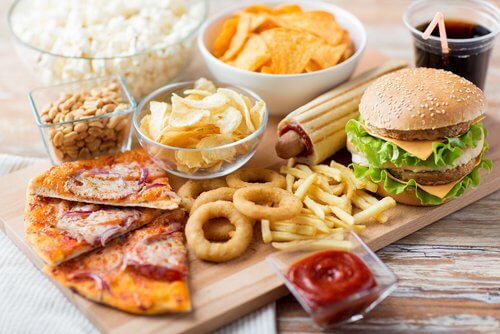Should You Be Eating Starchy Foods at Night?


Reviewed and approved by the pedagogue in physical education and nutritionist Elisa Morales Lupayante
People often say that what you eat for dinner is stored in your body and some believe eating starchy foods at night is particularly bad for you. This saying is based in the idea that if you go to bed right after eating body doesn’t get the chance to digest the food.
In this article you’ll find out if this hypothesis is true as well as the effects of eating starchy foods before you go to bed at night.
Eating starchy foods before bedtime
The consumption of this kind of foods at night has several consequences. Let’s see what science has to say about it.
Food and hormones

Before talking about eating flour-based foods at night, you need to understand how your hormones function. In addition, you need to understand the role that they play in your daily life. Those that suffer from obesity usually overeat out of anxiety or addiction and not strictly because of hunger. This is due to the production of serotonin.
This hormone has several functions. Among these, serotonin regulates your appetite, controls your body temperature, and plays a role in regulating your mood. Serotonin is controlled by two areas of your brain: the pineal gland and your hypothalamus. Both areas work on the basis of external light and dark.
This hormone is more active during daylight hours. After the evening, it falls and starts to cause feelings like depression, nervousness, or anxiety. Thus, it’s more likely to binge eat at night than in the morning.
But it doesn’t end there. This is because this hormone “chooses” what elements it wants to eat. Of course, it doesn’t choose healthy foods, like fruits or vegetables. Instead, it chooses sweets, carbohydrates, fats, and salty foods.
Read about How Anxiety Affects Body Odor
Starchy foods and depression
Many people who struggle with weight gain or obesity suffer from anxiety. They then eat foods with flour or sugar (or both) to relieve their distress.
These foods have antidepressant and sedative effects. However, they’re bad for you when you eat them at night. This is clear in this study published in Chronobiology International.
Sadness or frustration go hand-in-hand with the uncontrolled need to eat starchy foods at night. Eating refined carbohydrates leads to gain weight.
Eating flour at night isn’t “bad”. The problem lies in the amounts. This is exacerbated by the act of going to bed without first exercising and burning off the calories.
Furthermore, the fact that you can’t digest starches fast enough might cause stomach or intestinal problems like acid, flatulence, constipation, etc.
Another thing you need to keep in mind is the addiction caused by foods that use flours. In fact, there’s evidence that simple sugars could also lead to dependence in the medium term.
When you get cravings, you end up choosing pasta, bread, cookies, and other flour-based foods. This is because they have the ability to satisfy your appetite. Further than that, they reduce your anxiety or feelings of sadness.
Removing carbohydrates from your diet isn’t a good idea. However, it’s recommended that you reduce the amount of them you eat at night.
Did you know that carbs are essential for breakfast and lunch? Indeed, this is because they give you the energy you need to perform your activities. Then, you “burn” them over several hours. This doesn’t happen when you eat them for dinner because you don’t need the energy for sleeping.
On the other hand, you need foods that are easy to digest like fruits and vegetables. This way, you go to bed lighter and it’s easier to get to sleep and not gain weight.
Find out how to Control Your Appetite Naturally
How to prevent starchy food cravings
In theory, avoiding flour-based foods at night makes sense. But putting it into practice isn’t quite so easy, right? There are some “tricks” for reducing cravings that we can teach you, though. If you pay attention to these tips, they will help you lose weight little by little:
1. Exercise
Exercising helps in many ways. For instance, it improves your physical condition and reduces your weight. Physical activity can provenly contribute to maintaining good body composition.
Also, it acts as a stimulus for your mood. With half an hour per day of moderate exercise, you can control anxiety, stress, and depression.

2. Eat more fruit
Always keep your bowl of fruit full as is one of the keys for reducing the allure of carbohydrates and sweets. These foods keep your blood sugar levels stable and satisfy your appetite. Also, they have a lot of water, fiber, and vitamins.
The next time you crave candies, opt for an apple or a banana instead.
3. Drinking a lot of water will lessen your cravings for starchy foods
Sometimes you confuse hunger with thirst. When that happens, you may open the fridge and eat something instead of drinking liquids.
Stay well hydrated to prevent anxiety-induced cravings at night.
4. Listen to your body
It’s one thing for your stomach to growl from hunger. It’s something totally different to eat something just because you have a craving.
A good way to tell the difference between these feeling is to analyze what you want to eat.
Are you craving cookies or french fries? You may not be hungry, then. This is because if you really were hungry, you could eat almost anything without caring what it is.
5. Leave empty space in your stomach
Stuffing yourself with food at dinner is really bad for your health.
People usually abuse the amounts because they misjudge the portions they’re eating. Or, they eat very quickly and their stomach doesn’t have time to signal that it’s satisfied. Chew slowly and leave space between meals, you’ll soon notice when you’re full.
Avoid flours at night to lose weight
Eating starchy foods at night can be harmful to your health, especially in sedentary situations. It’s better to prioritize foods with a high protein content, as well as vegetables, before you go to bed.
All cited sources were thoroughly reviewed by our team to ensure their quality, reliability, currency, and validity. The bibliography of this article was considered reliable and of academic or scientific accuracy.
- Bo S, Musso G, et al. Consuming more of daily intake at dinner predisposes to obesity. A 6-year population-based protective cohort study. PloS One. Septiembre 2014. 9 (9):e108467.
- Grant CL, Coates AM, Dorrian J, Kennaway DJ, Wittert GA, Heilbronn LK, Pajcin M, Della Vedova C, Gupta CC, Banks S. Timing of food intake during simulated night shift impacts glucose metabolism: A controlled study. Chronobiol Int. 2017;34(8):1003-1013
- DiNicolantonio JJ, O’Keefe JH, Wilson WL. Sugar addiction: is it real? A narrative review. Br J Sports Med. 2018 Jul;52(14):910-913.
- Federación Española de Nutrición (FEN). Cereales y derivados.
- Fundación Española del Corazón. Nutrientes. Hidratos de carbono.
- Fundación para la Diabetes. Los hidratos de carbono.
- Harvard T. H. Chan. The nutrition source. Carbohydrates. Harvard School of Public Health.
- Sofer S, Eliraz A, et al. Greater weight loss and hormonal changes after 6 months diet with carbohydrates eaten mostly at dinner. Obesity. Octubre 2011. 19 (10): 2006-14.
- Swift DL, McGee JE, Earnest CP, Carlisle E, Nygard M, Johannsen NM. The Effects of Exercise and Physical Activity on Weight Loss and Maintenance. Prog Cardiovasc Dis. 2018 Jul-Aug;61(2):206-213.
- Vernia F, Di Ruscio M, et al. Sleep disorders related to nutrition and digestive diseases: a neglected clinical condition. International Journal of Medical Sciences. 2021. 18 (3): 593-603.
- Zitting K. M, Vujovic N, et al. Human resting energy expenditure varies with circadian phase. Current Biology. Noviembre 2018. 28 (22): 3685-3690.
This text is provided for informational purposes only and does not replace consultation with a professional. If in doubt, consult your specialist.








